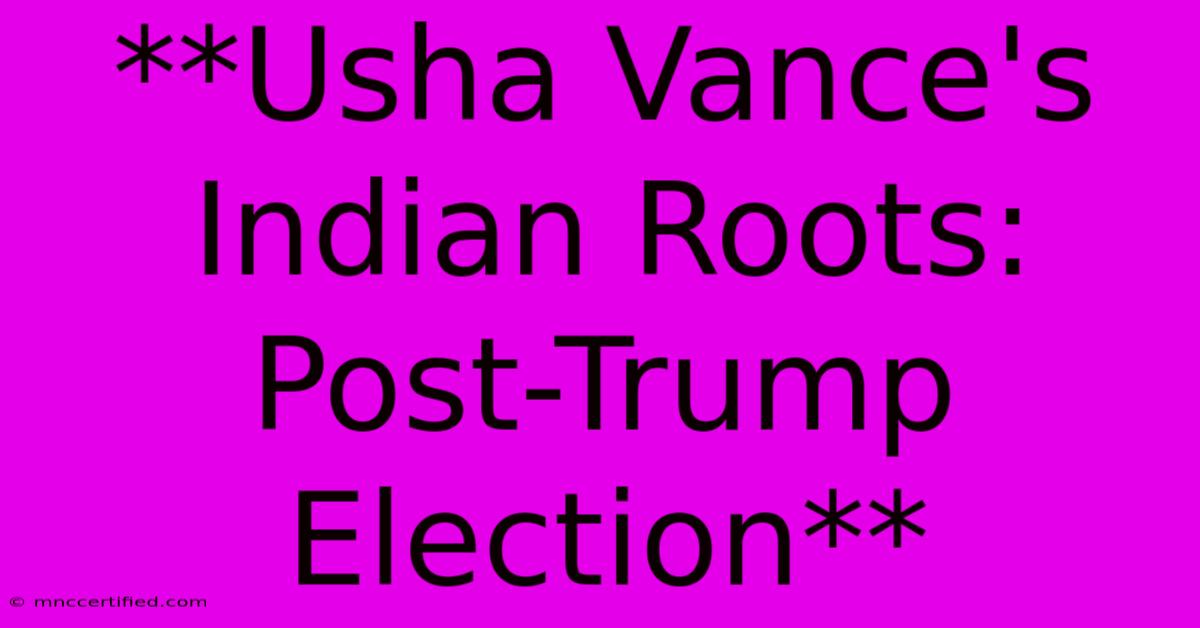**Usha Vance's Indian Roots: Post-Trump Election**

Table of Contents
Usha Vance's Indian Roots: Navigating Identity in the Post-Trump Era
The 2016 US Presidential election brought about a wave of anxieties and uncertainties, particularly for minorities. For Usha Vance, an Indian-American woman, the election results resonated deeply, forcing her to confront the complexities of her identity and the evolving landscape of her adopted country. This article delves into Usha's personal journey, examining how the political climate shaped her understanding of her Indian heritage and her place in America.
A Legacy of Immigration and Identity
Usha's story, like many Indian-Americans, is intertwined with the immigrant narrative. Her parents, hailing from a small village in South India, immigrated to the United States in the 1980s, driven by a desire for a better life and opportunities for their children. Growing up, Usha witnessed firsthand the challenges and triumphs of assimilation. She embraced American culture while also maintaining a strong connection to her Indian roots, celebrating festivals, learning her native language, and carrying on family traditions.
The Election's Impact: A Shift in Perspective
The Trump presidency brought about a palpable shift in the national discourse, often fueled by rhetoric that targeted minorities and immigrants. This environment left Usha feeling increasingly vulnerable and uncertain. She found herself questioning her place in a country that seemed to be turning its back on the very values her parents had fought for. The rise of anti-immigrant sentiment and the questioning of minority contributions to society sparked a deep sense of unease.
Redefining Identity: Finding Strength in Heritage
Amidst the prevailing anxieties, Usha chose to reclaim her Indian heritage as a source of strength and resilience. She actively sought out opportunities to engage with the Indian-American community, participating in cultural events and volunteering with organizations that promote inclusivity and cultural awareness. By connecting with her roots, she found a sense of belonging and solidarity, reminding herself that she was not alone in navigating this complex societal landscape.
Embracing Advocacy: Using Her Voice for Change
The post-election environment also fueled a sense of activism in Usha. Witnessing the escalating discrimination and prejudice against minorities, she felt compelled to use her voice to challenge injustice and advocate for inclusivity. She actively engaged in political discussions, joined protests, and contributed to organizations promoting social justice and equality.
Looking Forward: A Legacy of Hope
Usha's journey highlights the complexities of navigating identity in a rapidly changing world. While the post-Trump era presented significant challenges, it also served as a catalyst for self-reflection, community building, and active engagement. By embracing her Indian roots and utilizing her voice for positive change, Usha exemplifies the resilience and hope that define the immigrant experience. Her story serves as a reminder that even amidst uncertainty and challenges, embracing one's heritage and actively engaging in shaping a more just and inclusive society can empower individuals to contribute to a brighter future.
Keywords: Indian-American, immigrant experience, identity, post-Trump era, diversity, inclusivity, activism, social justice, community building, resilience, hope.
SEO Strategy:
- Target audience: Indian-American individuals and those interested in immigration and identity.
- Keywords: Include relevant keywords naturally throughout the article.
- On-page optimization: Utilize header tags (H2, H3) to break up text, bold key phrases, and incorporate internal and external links where appropriate.
- Off-page optimization: Promote the article on social media platforms and relevant online communities to increase its visibility.

Thank you for visiting our website wich cover about **Usha Vance's Indian Roots: Post-Trump Election**. We hope the information provided has been useful to you. Feel free to contact us if you have any questions or need further assistance. See you next time and dont miss to bookmark.
Featured Posts
-
Mark Cubans Advice To 16 Year Olds
Nov 07, 2024
-
Dogecoin Rallies 8 After Trump Win News
Nov 07, 2024
-
Trump Inauguration Date Ceremony And More
Nov 07, 2024
-
Shetland Reopens Explore The Islands
Nov 07, 2024
-
How Does Having Two Dental Insurances Work
Nov 07, 2024